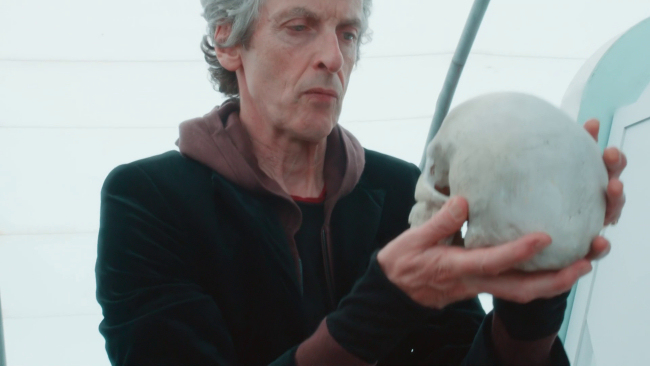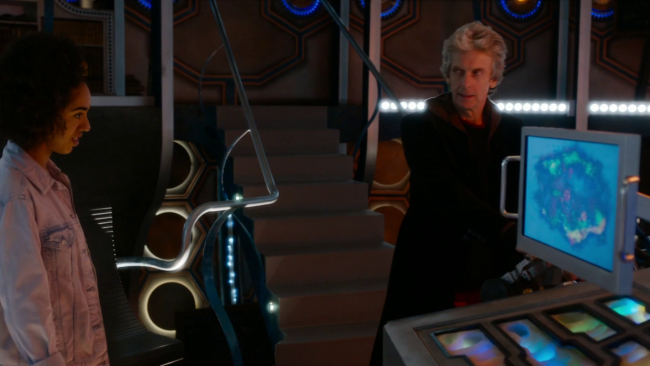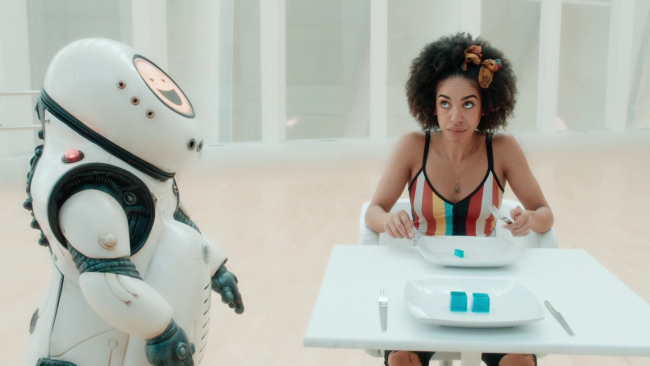
To-day's new episode of Doctor Who, "Smile", is certainly a step up from the last one Frank Cottrell-Boyce wrote, but considering the last episode he wrote was "Forest of the Night", that's not saying much. To give it more of the credit it deserves, "Smile" has some entertaining dialogue that's also thoughtful regarding social media to-day and potentially emerging AI. And in removing the overblown sentimentality of "Forest of the Night", "Smile" feels much more like a Doctor Who story--in fact, maybe too much because the episode is basically The Happiness Patrol meets The Robots of Death. One could argue whether Happiness Patrol is the better story but I don't think there's any question "Smile" falls well short of Robots of Death.
Spoilers after the screenshot

By coincidence, I watched Robots of Death again a few weeks ago, after which I wrote this about it in my blog:
Robots of Death is halfway between a story about slavery and a story about technology. There are pitfalls in treating another form of life as an allegory for human race relations, which the writer, Chris Boucher, seems conscious of in creating the villain of the episode as a human deluded into thinking he's leading a race of people into rightful rule over the galaxy for their physical and mental purity. But these aren't Daleks.
This is not a pitfall Cottrell-Boyce successfully avoided. Just because emerging sentience in AI might seem like a malfunction doesn't mean every malfunction is emerging sentience. The robots in "Smile" were established as killing people because their programming mistook grief as an enemy to happiness. How do we leap from that to thinking what the robots want is to negotiate with the humans to share space on this new world?

I did enjoy the early dialogue between the Doctor (Peter Capaldi) and Bill (Pearl Mackie) in the episode. Her asking what the point of chairs were that can't reach the console was funny. I wonder if someone keeps a list of questions new companions have asked the Doctor before.
Mainly the episode feels like Contrell-Boyce had a few nice big ideas--well, ideas from Happiness Patrol and Robots of Death--and then connected them badly. The story is filled with the characters doing odd things to move the plot where Cottrell-Boyce wants it to go, particularly near the end--why did the Doctor and Bill forget about the little kid? Why didn't the Doctor explain right away to the waking colonists what was going on?

Seeing the show repeat itself does make one appreciate how infrequently the show has done that in past fifty years. And maybe there is value in having these stories translated into concepts from our era. The eerie imperative to be happy is certainly an aspect of social media. I suppose Contrell-Boyce would've been better off focusing on that aspect, maybe making it a bit more like "The Bells of Saint John". I was intrigued by the idea of giving robots the imperative to enforce a concept like happiness which human beings themselves famously have trouble defining.
Twitter Sonnet #985
Peacock collars crowd the message out.
A piece of order languished for the pie.
A king acclaimed the fury of the doubt.
A flattened glade advanced the growing lie.
A boon inside the well approves the stone.
In time, my language girds a cedar plank.
A faceless sand took up the cheeks of bone.
Unwary candy left from Easter sank.
Incisive heels alarm the cooking legs.
On tables told to tallied men were motes.
A centre held the shell like splitting eggs.
A thousand crews mistook their sep'rate boats.
In faces seen in older glass are ears.
An E for A can turn the bears to beers.

No comments:
Post a Comment